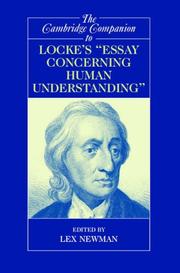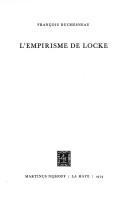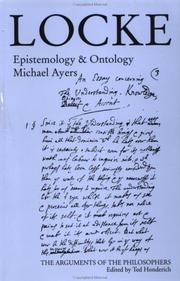| Listing 1 - 8 of 8 |
Sort by
|
Book
ISBN: 2729816623 9782729816629 Year: 2004 Publisher: Paris: Ellipses,
Abstract | Keywords | Export | Availability | Bookmark
 Loading...
Loading...Choose an application
- Reference Manager
- EndNote
- RefWorks (Direct export to RefWorks)
A l'origine de toute connaissance, l'Essai sur l'entendement humain (écrit entre 1671 et 1700), veut reconnaître le seul exercice des pouvoirs intellectuels de l'homme. Graduellement, de la simple perception jusqu'au raisonnement, Locke montre que notre pouvoir de penser ne découvre son étendue et ses limites qu'en s'exerçant. Ainsi lu, l'Essai apparaît comme un projet radical. Tous les principes reçus de la tradition (la « substance », ou les « idées innées ») y sont évalués au regard de cette exigence : rendent-ils compte de la manière dont nous pouvons au mieux employer nos facultés ? Héritier de Descartes pour la critique des obscurités philosophiques, Locke s'en émancipe ainsi du même mouvement. En fondant toute connaissance sur la seule opération de perception, et non sur la « substance pensante », il crée une percée qui sera investie par nombre de philosophies ultérieures.
Book
ISBN: 0824056086 9780824056087 Year: 1984 Publisher: New York (N.Y.): Garland
Abstract | Keywords | Export | Availability | Bookmark
 Loading...
Loading...Choose an application
- Reference Manager
- EndNote
- RefWorks (Direct export to RefWorks)

ISBN: 9780521542258 9780521834339 0521542251 0521834333 9781139001380 Year: 2007 Volume: *2 Publisher: Cambridge Cambridge university press
Abstract | Keywords | Export | Availability | Bookmark
 Loading...
Loading...Choose an application
- Reference Manager
- EndNote
- RefWorks (Direct export to RefWorks)
First published in 1689, John Locke's Essay Concerning Human Understanding is widely recognised as among the greatest works in the history of Western philosophy. The Essay puts forward a systematic empiricist theory of mind, detailing how all ideas and knowledge arise from sense experience. Locke was trained in mechanical philosophy and he crafted his account to be consistent with the best natural science of his day. The Essay was highly influential and its rendering of empiricism would become the standard for subsequent theorists. This Companion volume includes fifteen new essays from leading scholars. Covering the major themes of Locke's work, they explain his views while situating the ideas in the historical context of Locke's day and often clarifying their relationship to ongoing work in philosophy. Pitched to advanced undergraduates and graduate students, it is ideal for use in courses on early modern philosophy, British empiricism and John Locke.
Theory of knowledge --- Locke, John --- Knowledge, Theory of. --- Locke, John, --- Knowledge, Theory of --- Epistemology --- Philosophy --- Psychology --- Locke, John, - 1632-1704 - Essay concerning human understanding

ISBN: 9024713498 9789024713493 Year: 1973 Volume: 57 Publisher: La Haye Nijhoff
Abstract | Keywords | Export | Availability | Bookmark
 Loading...
Loading...Choose an application
- Reference Manager
- EndNote
- RefWorks (Direct export to RefWorks)
Empiricism --- Empirisme --- Locke, John, --- Sydenham, Thomas, --- Experience --- Knowledge, Theory of --- Rationalism --- Locke, John --- Sydenham, Thomas --- ロック --- 로크 --- Empiricism. --- Locke, John, - 1632-1704 - Essay concerning human understanding
Book
ISBN: 0824056124 9780824056124 Year: 1984 Publisher: New York (N.Y.): Garland
Abstract | Keywords | Export | Availability | Bookmark
 Loading...
Loading...Choose an application
- Reference Manager
- EndNote
- RefWorks (Direct export to RefWorks)
Book
ISBN: 0824056000 9780824056001 Year: 1984 Publisher: New York (N.Y.): Garland
Abstract | Keywords | Export | Availability | Bookmark
 Loading...
Loading...Choose an application
- Reference Manager
- EndNote
- RefWorks (Direct export to RefWorks)

ISBN: 0415100305 9780415100304 Year: 1993 Publisher: London Routledge
Abstract | Keywords | Export | Availability | Bookmark
 Loading...
Loading...Choose an application
- Reference Manager
- EndNote
- RefWorks (Direct export to RefWorks)
Knowledge, Theory of --- -Ontology --- -Being --- Philosophy --- Metaphysics --- Necessity (Philosophy) --- Substance (Philosophy) --- Epistemology --- Theory of knowledge --- Psychology --- History --- -History --- -Locke, John --- ロック --- 로크 --- Ontology --- Locke, John, --- Being --- Knowledge, Theory of - History - 17th century --- Ontology - History - 17th century --- Locke, John, - 1632-1704 - Essay concerning human understanding --- Locke, John (1632-1704) --- Ontologie --- Critique et interprétation --- 17e siècle
Book
ISBN: 1782047042 1580465617 9781580465618 9781782047049 Year: 2016 Publisher: Rochester, NY University of Rochester Press
Abstract | Keywords | Export | Availability | Bookmark
 Loading...
Loading...Choose an application
- Reference Manager
- EndNote
- RefWorks (Direct export to RefWorks)
The Empire of Habit critiques the traditional interpretation of Locke's political thought, revealing that the foundation of Lockean liberalism is not natural law but discipline and habit.
Theorie de la connaissance. --- Liberalisme. --- Liberalism --- Knowledge, Theory of. --- Knowledge, Theory of --- Philosophy. --- Locke, John (1632-1704). --- Locke, John, --- Essay concerning human understanding (Locke, John) --- Epistemology --- Theory of knowledge --- Philosophy --- Psychology --- Draft A of Locke's Essay concerning human understanding (Locke, John) --- Draft B of Locke's Essay concerning human understanding (Locke, John) --- Essay of humane understanding (Locke, John) --- Essay concerning humane understanding (Locke, John) --- Abridgement of Mr. Locke's Essay concerning humane understanding (Locke, John) --- Treatise upon the human understanding (Locke, John) --- Early draft of Locke's Essay (Locke, John) --- Essay concerning the understanding, knowledge, opinion, and assent (Locke, John) --- Early works to 1800. --- Liberalism - Philosophy --- Knowledge, Theory of - Early works to 1800 --- Locke, John, - 1632-1704 - Essay concerning human understanding --- Locke, John, - 1632-1704 - Some thoughts concerning education --- John Locke. --- authoritarianism. --- capitalism. --- communism. --- conservatism. --- democracy. --- dictatorship. --- international relations. --- liberalism. --- philosophy. --- political science. --- psychology. --- socialism. --- sociology.
| Listing 1 - 8 of 8 |
Sort by
|

 Search
Search Feedback
Feedback About UniCat
About UniCat  Help
Help News
News